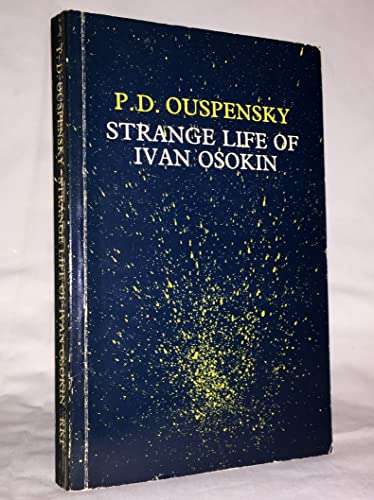
The Strange Life of Ivan Osokin: A Novel by P.D.Ouspensky (Philosopher)
Check my rate
| Main centres: | 1-3 business days |
| Regional areas: | 3-4 business days |
| Remote areas: | 3-5 business days |

| Main centres: | 1-3 business days |
| Regional areas: | 3-4 business days |
| Remote areas: | 3-5 business days |
Here is the story of Ivan Osokin, a young man who has squandered every chance life has given him. A failure at school, ruined financially, and rejected by the woman he loves, he finds himself at a dead end. He wishes to live his life over again so he can avoid all his mistakes. Then he meets a magician who gives him that chance.
Strange Life of Ivan Osokin is a gripping, cinematic story by the great Russian philosopher P.D. Ouspensky. In his classic novel, set in the last years of Tsarist Russia, Ouspensky explores imaginatively one of the chief themes in his philosophical work: the idea of "eternal recurrence." This is the fascinating idea, which also engaged Schopenhauer and Nietzsche, that we live our lives over and over again in a kind of endlessly repeating film, and that nothing will change in this ceaseless whirligig, unless we ourselves change-deeply and fundamentally.
Author Biography: P.D. Ouspensky (1878-1947) was one of the seminal thinkers of the twentieth century. Mystic, philosopher, mathematician, and writer, he was one of the first in the modern era to explore questions of higher consciousness and personal transformation. Strange Life of Ivan Osokin is Ouspensky's only novel. Ouspensky's other works include Tertium Organum, A New Model of the Universe, and In Search of the Miraculous.
P.D. Ouspensky was a Russian philosopher and esotericist known for his expositions of the early work of the Greek-Armenian teacher of esoteric doctrine George Gurdjieff. He met Gurdjieff in Moscow in 1915, and was associated with the ideas and practices originating with Gurdjieff from then on. He taught ideas and methods based in the Gurdjieff system for 25 years in England and the United States, although he separated from Gurdjieff personally in 1924, for reasons that are explained in the last chapter of his book In Search of the Miraculous.
Ouspensky studied the Gurdjieff system directly under Gurdjieff's own supervision for a period of ten years, from 1915 to 1924. In Search of the Miraculous recounts what he learned from Gurdjieff during those years. While lecturing in London in 1924, he announced that he would continue independently the way he had begun in 1921. Some, including his close pupil Rodney Collin, say that he finally gave up the system in 1947, just before his death, but his own recorded words on the subject ("A Record of Meetings", published posthumously) do not clearly endorse this judgement.[3]